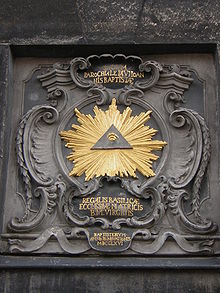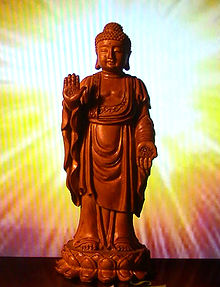- Mysticism
-
 The Appearance of the Holy Spirit before Saint Teresa of Ávila, Peter Paul Rubens
The Appearance of the Holy Spirit before Saint Teresa of Ávila, Peter Paul Rubens
Mysticism (
 pronunciation (help·info); from the Greek μυστικός, mystikos, meaning 'an initiate') is the knowledge of, and especially the personal experience of, states of consciousness, i.e. levels of being, beyond normal human perception, including experience and even communion with a supreme being.
pronunciation (help·info); from the Greek μυστικός, mystikos, meaning 'an initiate') is the knowledge of, and especially the personal experience of, states of consciousness, i.e. levels of being, beyond normal human perception, including experience and even communion with a supreme being.Contents
Classical origins
A "mystikos" was an initiate of a mystery religion. The Eleusinian Mysteries, (Greek: Ἐλευσίνια Μυστήρια) were annual initiation ceremonies in the cults of the goddesses Demeter and Persephone, held in secret at Eleusis (near Athens) in ancient Greece.[1] The mysteries began in about 1600 B.C. in the Mycenean period and continued for two thousand years, becoming a major festival during the Hellenic era, and later spreading to Rome.[2]
Modern understanding
The present meaning of the term mysticism arose via Platonism and Neoplatonism—which referred to the Eleusinian initiation as a metaphor for the "initiation" to spiritual truths and experiences—and is the pursuit of communion with, identity with, or conscious awareness of an ultimate reality, divinity, spiritual truth, or God through direct experience, intuition, instinct or insight. Mysticism usually centers on practices intended to nurture those experiences. Mysticism may be dualistic, maintaining a distinction between the self and the divine, or may be nondualistic. [3]
Many if not all of the world's great religions have arisen around the teachings of mystics (including Buddha, Jesus, Lao Tze, and Krishna); and most religious traditions describe fundamental mystical experience, at least esoterically. Enlightenment or Illumination are generic English terms for the phenomenon, derived from the Latin illuminatio (applied to Christian prayer in the 15th century) and adopted in English translations of Buddhist texts, but used loosely to describe the state of mystical attainment regardless of faith. [4]
Conventional religions, by definition, have strong institutional structures, including formal hierarchies and mandated sacred texts and/or creeds. Adherents of the faith are expected to respect or follow these closely, so mysticism is often deprecated or persecuted.[5]
The following table briefly summarizes the major forms of mysticism within world religions and their basic concepts.
Mysticism in World Religions Host Religion Form of Mysticism Basic Concept Sources of Information Buddhism Shingon, Tibetan, Zen attainment of Nirvana, Satori: connection to ultimate reality [6] [7] Christianity Catholic spirituality, Quaker tradition, Christian mysticism, Gnosticism Spiritual enlightenment, Spiritual vision, the Love of God, union with God (Theosis) [8] [9] [10] Freemasonry - Enlightenment [11] Hinduism Vedanta, Yoga, Bhakti, Kashmir Shaivism liberation from cycles of Karma, non-identification (Kaivalya), experience of ultimate reality (Samadhi), Innate Knowledge (Sahaja and Svabhava) [12] Islam Sufism, Irfan Innate knowledge, union with God (fana) [13] Jainism Moksha liberation from cycles of Karma [14] Judaism Kabbalah, Hassidic Judaism abnegation of the ego, Ein Sof [15] Rosicrucianism - - [16] Sikhism - liberation from cycles of Karma [17] [18] Taoism - Te: connection to ultimate reality [19] Literary Forms used by Spiritual Teachers
Since, by definition, mystical knowledge cannot be directly written down or spoken of (but must be experienced), numerous literary forms that allude to such knowledge - often with contradictions or even jokes - have developed, for example:
Aphorisms, poetry
Aphorisms and poetry include artistic efforts to crystallize some particular description or aspect of the mystical experience in words:
-
- God is Love (Christian and Sufi in particular)
- Atman is Brahman (Advaitan)
- God and me, me and God, are One (Kundalini Yoga, Sikhism)
- Zen haiku
- Rumi's love poems[20] (Sufism)
Koans, riddles, contradictions
Zen koans, riddles, and metaphysical contradictions are intentionally irresolvable tasks or lines of thought, designed to direct one away from intellectualism and effort towards direct experience. [21]
-
- "What is the sound of one hand (clapping)?" (Zen)
- "How many angels can stand on the head of a pin?" (Christian).
These can be meant as humorous phrases (see humour, below); or as serious questions with significant mystical answers. Others believe that the most edifying understanding of these riddles is that excessive effort contemplating the impossible can give an individual the opportunity to stop trying to 'achieve' and start just 'being'.
-
- The evocative Taoist phrase—To yield is to be preserved whole, to be bent is to become straight, to be empty is to be full, to have little is to possess[22] —is another example of a metaphysical contradiction describing the path of emptying the learned self.
Jokes
Jokes and humorous stories can be used in spiritual teaching to make simple yet profound metaphysical points:
-
- Some examples are the Nasrudin tales[23], e.g. someone shouts at Nasrudin sitting on a river bank, "How do I get across?" "You are across." he replies;
-
- the Trickster or Animal Spirit stories passed down in Native American, Australian Aboriginal, and African Tribal folklore, and even the familiar "Br'er Rabbit and the Tar Baby"[25].
Stories, parables, metaphors
Parables and metaphor include stories that have a deeper meaning to them:
-
- Jesus makes use of parables and metaphors when teaching his followers. See Parables of Jesus.
Some Passages seem to be aphorisms, riddles and parables all at once. For instance, Yunus Emre's famous passage:
- I climbed into the plum tree
- and ate the grapes I found there.
- The owner of the garden called to me,
- "Why are you eating my walnuts?"
A perennial philosophy
The centuries-old idea of a perennial philosophy, popularized by Aldous Huxley in his 1945 book: The Perennial Philosophy, states one view of what mysticism is all about:
[W]ith the one, divine reality substantial to the manifold world of things and lives and minds. But the nature of this one reality is such that it cannot be directly or immediately apprehended except by those who have chosen to fulfill certain conditions, making themselves loving, pure in heart, and poor in spirit.[26]
The unknowable
According to Schopenhauer,[27] mystics arrive at a condition in which there is no knowing subject and known object:
... we see all religions at their highest point end in mysticism and mysteries, that is to say, in darkness and veiled obscurity. These really indicate merely a blank spot for knowledge, the point where all knowledge necessarily ceases. Hence for thought this can be expressed only by negations, but for sense-perception it is indicated by symbolical signs, in temples by dim light and silence, in Brahmanism even by the required suspension of all thought and perception for the purpose of entering into the deepest communion with one's own self, by mentally uttering the mysterious Om. In the widest sense, mysticism is every guidance to the immediate awareness of what is not reached by either perception or conception, or generally by any knowledge. The mystic is opposed to the philosopher by the fact that he begins from within, whereas the philosopher begins from without. The mystic starts from his inner, positive, individual experience, in which he finds himself as the eternal and only being, and so on. But nothing of this is communicable except the assertions that we have to accept on his word; consequently he is unable to convince.
— Schopenhauer, The World as Will and Representation, Vol. II, Ch. XLVIII
References and footnotes
- ^ Kerényi, Karoly, "Kore," in C.G. Jung and C. Kerényi, Essays on a Science of Mythology: The Myth of the Divine Child and the Mysteries of Eleusis. Princeton: Princeton University Press, 1963: pages 101-55.
- ^ Eliade, Mircea, A History of Religious Ideas: From the Stone Age to the Eleusinian Mysteries. Chicago: University of Chicago Press, 1978.
- ^ W.F. Cobb. Mysticism and the Creed. BiblioBazaar, 2009. ISBN 978-1113209375
- ^ Evelyn Underhill. Practical Mysticism. Wilder Publications, new edition 2008. ISBN 978-1604595086
- ^ David Steindl-Rast. The Mystical Core of Organized Religion. ReVision, Summer 1989. 12 (1):11-14. Council on Spiritual Practices Retrieved 29 October 2011
- ^ D.T. Suzuki. Mysticism: Christian and Buddhist. Routledge, 2002. ISBN 978-0415285865
- ^ Shunryu Suzuki. Zen Mind, Beginner's Mind. Shambhala. New edition 2011.
- ^ Louth, Andrew., The Origins of the Christian Mystical Tradition. Oxford: Oxford University Press, 2007. ISBN 978-0-19-929140-3.
- ^ King, Ursula. Christian Mystics: Their Lives and Legacies Throughout the Ages. London: Routledge 2004.
- ^ Fanning, Steven., Mystics of the Christian Tradition. New York: Routledge Press, 2001.
- ^ Michael R. Poll. Masonic Enlightenment - The Philosophy, History And Wisdom Of Freemasonry. Michael Poll Publishing, 2006.
- ^ S. N. Dasgupta. Hindu Mysticism. BiblioBazaar, 2009. ISBN 978-0559069895
- ^ Reynold A. Nicholson. Studies in Islamic Mysticism. Routledge. New edition 2001. ISBN 978-0700702787
- ^ T.K. Tukol. Yoga, Meditation & Mysticism in Jainism (Shri Raj Krishen Jain memorial lectures). Shri Raj Krishen Jain Charitable Trust, 1978.
- ^ Elior, Rachel, Jewish Mysticism: The Infinite Expression of Freedom, Oxford. Portland, Oregon: The Littman Library of Jewish Civilization, 2007.
- ^ A.E. Waite. Rosicrucian Rites and Ceremonies of the Fellowship of the Rosy Cross by Founder of the Holy Order of the Golden Dawn. Ishtar, 2008. ISBN 978-0978388348
- ^ Mohan Singh Uberoi. Sikh Mysticism. 1964.
- ^ Krishna Chattopadhyay. The world of mystics: A comparative study of Baul, Sufi and Sikh mysticism. R.K. Prakashan, 1993.
- ^ Harold D Roth. Original Tao: Inward Training (Nei-yeh) and the Foundations of Taoist Mysticism. Columbia University Press. New Edition, 2004. ISBN 978-0231115650
- ^ Jalaluddin Rumi: Poems
- ^ Koun Yamada. The Gateless Gate: The Classic Book of Zen Koans. Wisdom Publications. New edition, 2005. ISBN 978-0861713820
- ^ Tao Te Ching. LinYutan version. Chapter 22, sentence 1. For other versions see TTC Compared
- ^ Nasruddin stories
- ^ *Bektashi jokes
- ^ Brer Rabbit and the Tar Baby retold by S.E. Schlosser as 'A Georgia Folktale'. Retrieved 29 October 2011.
- ^ Huxley, Aldous (1945). The Perennial Philosophy. Perennial. ISBN 0-06-057058-X.
- ^ Schopenhauer, Arthur (1844). Die Welt als Wille und Vorstellung. 2.
Further reading
- Daniels, P., Horan A., (1987) "Mystic Places". Alexandria, Time-Life Books, ISBN 0-8094-6312-1.
- Fanning, Steven., Mystics of the Christian Tradition. New York: Routledge Press, 2001.
- Louth, Andrew., The Origins of the Christian Mystical Tradition. Oxford: Oxford University Press, 2007. ISBN 978-0-19-929140-3.
- McGinn, Bernard, The Presence of God: A History of Western Christian Mysticism'.' Vol. 1 - 4. (The Foundations of Mysticism; The Growth of Mysticism; The Flowering of Mysticism) New York: Crossroad, 1997-2005.
- "Buried Memories on the Acropolis. Freud's Relation to Mysticism and Anti-Semitism", International Journal of Psycho-Analysis, Volume 59 (1978): 199-208. (Jeffrey Masson and Terri C. Masson)
- Chronicle Books. Mysticism, the Experience of the Devine: Medieval Wisdom. Labyrinth, 2004.
- Underhill, Evelyn. Mysticism: A Study in the Nature and Development of Spiritual Consciousness. 1911
- Stace, W. T. Mysticism and Philosophy. 1960.
- Stace, W. T. The Teachings of the Mystics, 1960.
- King, Ursula. Christian Mystics: Their Lives and Legacies Throughout the Ages. London: Routledge 2004.
- Langer, Otto. Christliche Mystik im Mittelalter. Mystik und Rationalisierung – Stationen eines Konflikts. Darmstadt: 2004.
- Kroll, Jerome, Bernard Bachrach, The Mystic Mind: The Psychology of Medieval Mystics and Ascetics, New York and London: Routledge, 2005.
- Elior, Rachel, Jewish Mysticism: The Infinite Expression of Freedom, Oxford. Portland, Oregon: The Littman Library of Jewish Civilization, 2007.
- Louth, Andrew, The Origins of the Christian Mystical Tradition (Oxford: 2007).
- Harmless, William, Mystics. (Oxford: 2008).
- Otto, Rudolf (author); Bracy, Bertha L. (translator) & Payne, Richenda C. (1932, 1960). Mysticism East and West: A Comparative Analysis of the Nature of Mysticism. New York, N. Y., USA: The Macmillan Company
- Dinzelbacher, Peter (hg), Mystik und Natur. Zur Geschichte ihres Verhältnisses vom Altertum bis zur Gegenwart (Berlin: 2009) (Theophrastus Paracelsus Studien, 1).
- Merton, Thomas, An Introduction to Christian Mysticism: Initiation into the Monastic Tradition, 3. (Kalamazoo: 2008) (Monastic Wisdom series).
- Nelstrop, Louise, Kevin Magill and Bradley B. Onishi, Christian Mysticism: An Introduction to Contemporary Theoretical Approaches (Aldershot: 2009).
- Baba, Meher (1995). Discourses. Myrtle Beach, S.C.: Sheriar Foundation. ISBN 1-880619-09-1. http://www.discoursesbymeherbaba.org.
External links
- Resources > Medieval Jewish History > Jewish Mysticism The Jewish History Resource Center, The Hebrew University of Jerusalem
- "Mysticism" Stanford Encyclopedia of Philosophy
- "Mysticism" Encyclopedia of Religion and Society
- "Self-transcendence enhanced by removal of portions of the parietal-occipital cortex" Article from the Institute for the Biocultural Study of Religion
Theology Outline of theology Apologetics GeneralBahá'íChristianChristian apologetics · Christian apologists · List of Christian apologetic works · Ecumenical Apologetics · Presuppositional apologetics · Epistle to Diognetus · Trilemma · Urmonotheismus · More...MuslimMuslim apologistsConceptions of God Divine presenceGod as theGod inAbrahamic religions · Bahá'í Faith · Buddhism · Christianity · Hinduism · Islam · Jainism · Judaism · Sikhism · Zoroastrianism · More...Names of God inSingular GodBinitarianismTrinitarianismOtherAristotelian view of God · Attributes · Demiurge · Divine simplicity · Egotheism · Godhead (Christianity) · Godhead (Latter Day Saints) · Great Architect of the Universe · Great Spirit · Apophatic theology · Olelbis · Open theism · Personal god · Phenomenological definition of God · Philo's view of God · Sarav viāpak · Taryenyawagon · The All · Tian · Unmoved mover · More...Eschatology Afterlife · Apocalypticism · Buddhist · Christian · Concepts of Heaven · Doomsday films · Ghost Dance Movement · Ghosts · Hindu · Islamic · Jewish · Personifications of death · Taoist · Zoroastrian · MoreExistence of God arguments againstfromotherarguments forfromA proper basis · Beauty · Consciousness · Degree · Desire · Love · Miracles · Morality · Reason · Religious experienceotherChristological · Cosmological · Ontological · Pascal's wager · Teleological · Trademark · Transcendental · Witness · More...Opposition to religion Anti-Buddhism (Criticism · Persecution) · Catholicism · Christianity (Criticism · anti-Christian sentiment · Persecution) · Gnosticism · Hinduism (Criticism) · Islam (Criticism · Islamophobia · Persecution) · Jainism (Criticism) · Judaism (Criticism) · Protestantism · cult movement · Zoroastrianism · More...OtherTheism List of philosophical theories · Deity (Divinity · Numen · Male · Female · Gender of) · Deism · Dystheism · Henotheism · Hermeticism · Kathenotheism · Nontheism · Monolatrism · Monotheism · Mysticism · Panentheism · Pandeism · Pantheism · Polydeism · Polytheism · Spiritualism · Theopanism · More...Theologies History of · Outline · of the Bible · Terms · Christology · Cosmology · Ecclesiology · Ethics · Hamartiology · Law · Messianism · Movements · Nestorianism · New testament · Old testament · Philosophy · Practical · Sophiology · Soteriology · More...HinduJewishOtherEducation Anglican · Buddhist · Eastern Orthodox · Evangelical · Islamic · Jewish · Lutheran · Madrassas · Methodist · Reformed Church · Roman Catholic · More...Schools by religious affiliationBahá'í · Buddhist · Anglican · Assemblies of God · Baptist · Eastern Orthodox · Hindu · Islamic · Jewish · Latter Day Saints · Lutheran · Mennonite · Methodist · Nondenominational Christian · Presbyterian · Quaker · Roman Catholic · Seventh-Day AdventistResources List of theological journals · More...Practitioners Teachers · TheologiansPhilosophy Positions Certainty (Skepticism · Solipsism · Nihilism) · Ethics (Consequentalism · Deontology · Virtue) · Free will (Compatibilism · Determinism · Libertarianism) · Metaphysics (Atomism · Dualism · Monism · Naturalism) · Epistemology (Constructivism · Empiricism · Idealism · Rationalism) · Naturalism · Normativity (Absolutism · Particularism · Relativism · Universalism) · Ontology (Action · Event · Process) · Reality (Anti-realism · Idealism · Materialism · Realism) · Society (Agrarianism · Egalitarianism · Humanism)
Schools of
thoughtAncient (Axial Age) · Western (Medieval · Renaissance · Modern) · Eastern · Contemporary (Analytic · Continental)
Chinese (Agriculturalism · Confucianism · Legalism · Logicians · Mohism · Chinese naturalism · Neotaoism · Taoism · Zen) · Greek & Greco-Roman (Aristotelianism · Cynicism · Epicureanism · Neoplatonism · Peripatetic · Platonism · Presocratic · Pythagoreanism · Sophism · Stoicism) · Indian (Buddhist · Cārvāka · Hindu · Jain) · Persian (Mazdakism · Zoroastrianism · Zurvanism)
9th–16th centuriesChristian Europe (Scholasticism · Renaissance humanism · Thomism) · East Asian (Korean Confucianism · Rigaku · Neo-Confucianism) · Islamic (Averroism · Avicennism · Persian Illuminationism · Sufi) · Jewish (Judeo-Islamic)
17th–21st centuriesAbsolute idealism · Australian realism · Behaviorism · Cartesianism · Classical liberalism · Deconstruction · Dialectical materialism · Epiphenomenalism · Egoism · Existentialism · Feminist · Functionalism · Hegelianism · Kantianism · Kyoto school · Legal positivism · Logical positivism · Marxism · Mitogaku · Modernism · Neo-Kantianism · New Confucianism · New Philosophers · Objectivism · Ordinary language · Particularism · Phenomenology · Postmodernism · Post-structuralism · Pragmatism · Reformed epistemology · Structuralism · Transcendentalism · Transmodernism · Utilitarianism · more...
Lists Branches Metaphysics · Epistemology · Logic · Ethics · Aesthetics
Philosophy ofAction · Art · Being · Biology · Chemistry · Education · Economics · Engineering · Environment · Film · Geography · Information · Healthcare · History · Human nature · Humor · Language · Law · Literature · Mathematics · Mind · Music · Pain · Philosophy · Physics · Politics · Psychology · Religion (Hermeneutics) · Science · Sexuality · Social science · Technology · War
By region Portal · Category · WikiProject · changes Categories:- Mysticism
- Esotericism
- New Age practices
-
Wikimedia Foundation. 2010.




